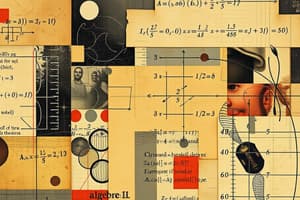Podcast
Questions and Answers
Which of the following is NOT a zero of $f(x) = 2x^3 - 5x^2 - 14x + 8$ given $f(4) = 0$?
Which of the following is NOT a zero of $f(x) = 2x^3 - 5x^2 - 14x + 8$ given $f(4) = 0$?
- 4
- -2
- 8 (correct)
- 2
What is the sum of $a$, $b$, and $c$ when $2x^4 - x^3 + 4$ is divided by $x + 1$ yielding the expression $2x^3 - 3x^2 + ax + b + x + 1$?
What is the sum of $a$, $b$, and $c$ when $2x^4 - x^3 + 4$ is divided by $x + 1$ yielding the expression $2x^3 - 3x^2 + ax + b + x + 1$?
- 7 (correct)
- 1
- -1
- 13
How many zeros, with multiplicities, does the equation $f(x) = x^2(x + 6)(x - 1)^2$ have?
How many zeros, with multiplicities, does the equation $f(x) = x^2(x + 6)(x - 1)^2$ have?
- 6
- 3
- 4
- 5 (correct)
If $h(-2) = 0$, which of the following is NOT true?
If $h(-2) = 0$, which of the following is NOT true?
Which function could represent $g(x)$ based on the given graph?
Which function could represent $g(x)$ based on the given graph?
If $(x + 5)$ is a factor of the polynomial $p(x) = x^3 - 2x^2 - 23x + 60$, which of the following represents the other factors?
If $(x + 5)$ is a factor of the polynomial $p(x) = x^3 - 2x^2 - 23x + 60$, which of the following represents the other factors?
If $x = -6$ is a root of $f(x) = x^3 + 6x^2 + 5x + 30$, which of the following is also a root of $f(x)$?
If $x = -6$ is a root of $f(x) = x^3 + 6x^2 + 5x + 30$, which of the following is also a root of $f(x)$?
Which statement is FALSE based on the provided graph?
Which statement is FALSE based on the provided graph?
What is the y-intercept of the quadratic function $y = 2(x - 2)^2 + 2$?
What is the y-intercept of the quadratic function $y = 2(x - 2)^2 + 2$?
Which quadratic function has the wider graph?
Which quadratic function has the wider graph?
What are the solutions to the quadratic equation $x^2 - 6x = -15$?
What are the solutions to the quadratic equation $x^2 - 6x = -15$?
Under what condition does the equation $ax^2 - bx = 0$ imply that $x = 0$ is a solution?
Under what condition does the equation $ax^2 - bx = 0$ imply that $x = 0$ is a solution?
How do you rewrite the quadratic function $y = -x^2 - 8x - 7$ in vertex form?
How do you rewrite the quadratic function $y = -x^2 - 8x - 7$ in vertex form?
What is the value of the discriminant for the quadratic function $y = 2x^2 - 3x + 5$ and what does it indicate?
What is the value of the discriminant for the quadratic function $y = 2x^2 - 3x + 5$ and what does it indicate?
What are the remaining zeros of the polynomial $f(x) = 7x^3 - 33x^2 + 15x + 20$ given that $x = 4$ is a zero?
What are the remaining zeros of the polynomial $f(x) = 7x^3 - 33x^2 + 15x + 20$ given that $x = 4$ is a zero?
What is the result of multiplying the binomials $(2x - 3)(3x + 2)$?
What is the result of multiplying the binomials $(2x - 3)(3x + 2)$?
What is the solution to the inequality $2|x + 3| > 6$ written in interval notation?
What is the solution to the inequality $2|x + 3| > 6$ written in interval notation?
What is the correct quadratic function $f(x)$ that intersects the x-axis at the points $(-3, 0)$ and $(5, 0)$ and has a point $(1, -32)$?
What is the correct quadratic function $f(x)$ that intersects the x-axis at the points $(-3, 0)$ and $(5, 0)$ and has a point $(1, -32)$?
Which equation represents the axis of symmetry for the parabola that passes through the points $(-4, 0)$ and $(6, 0)$?
Which equation represents the axis of symmetry for the parabola that passes through the points $(-4, 0)$ and $(6, 0)$?
What is the equation of the line in slope-intercept form that goes through the point $(-4, 2)$ and is perpendicular to the line $y = -\frac{1}{3}x + 2$?
What is the equation of the line in slope-intercept form that goes through the point $(-4, 2)$ and is perpendicular to the line $y = -\frac{1}{3}x + 2$?
Which quadratic function has a minimum value of -4 and an axis of symmetry at $x = 2$?
Which quadratic function has a minimum value of -4 and an axis of symmetry at $x = 2$?
Which representation corresponds to the quadratic function $y = -2(x + 2)(x - 1)$?
Which representation corresponds to the quadratic function $y = -2(x + 2)(x - 1)$?
What is the product of the solutions to the system of equations $3x - y + 5 = 0$ and $2x + 3y - 4 = 0$?
What is the product of the solutions to the system of equations $3x - y + 5 = 0$ and $2x + 3y - 4 = 0$?
Flashcards
Find the y-intercept
Find the y-intercept
The y-intercept is the point where the graph crosses the y-axis. To find the y-intercept, set x = 0 and solve for y.
Narrowest graph
Narrowest graph
The coefficient of the x² term determines the width of the graph. A larger absolute value of the coefficient means a narrower graph.
Solving quadratic equations
Solving quadratic equations
A quadratic equation in the form ax² + bx + c = 0 can be solved using the quadratic formula: x = (-b ± √(b² - 4ac)) / 2a. If the discriminant (b² - 4ac) is negative, the solutions are complex numbers.
Vertex form of a quadratic equation
Vertex form of a quadratic equation
Signup and view all the flashcards
Discriminant of a quadratic equation
Discriminant of a quadratic equation
Signup and view all the flashcards
Multiplying binomials
Multiplying binomials
Signup and view all the flashcards
Equation of a circle
Equation of a circle
Signup and view all the flashcards
Zeros and multiplicities of a polynomial function
Zeros and multiplicities of a polynomial function
Signup and view all the flashcards
What are the roots of a polynomial?
What are the roots of a polynomial?
Signup and view all the flashcards
Polynomial Division and Sum of Coefficients
Polynomial Division and Sum of Coefficients
Signup and view all the flashcards
What is a zero with multiplicity?
What is a zero with multiplicity?
Signup and view all the flashcards
Factor Theorem and Remainder Theorem
Factor Theorem and Remainder Theorem
Signup and view all the flashcards
How to Determine End Behavior of a Polynomial
How to Determine End Behavior of a Polynomial
Signup and view all the flashcards
Finding Other Factors of a Polynomial
Finding Other Factors of a Polynomial
Signup and view all the flashcards
Complex Conjugate Root Theorem
Complex Conjugate Root Theorem
Signup and view all the flashcards
Matching Polynomial Properties with a Graph
Matching Polynomial Properties with a Graph
Signup and view all the flashcards
Solving absolute value inequalities
Solving absolute value inequalities
Signup and view all the flashcards
Solving absolute value equations
Solving absolute value equations
Signup and view all the flashcards
Evaluating functions
Evaluating functions
Signup and view all the flashcards
Product of solutions in a system of equations
Product of solutions in a system of equations
Signup and view all the flashcards
Slope-intercept form of a linear equation
Slope-intercept form of a linear equation
Signup and view all the flashcards
Axis of symmetry of a parabola
Axis of symmetry of a parabola
Signup and view all the flashcards
Factored form of a quadratic function
Factored form of a quadratic function
Signup and view all the flashcards
Vertex form of a quadratic function
Vertex form of a quadratic function
Signup and view all the flashcards
Study Notes
Algebra II Review - Unit 1 & 2
- Solving Inequalities: Interval notation used to express solutions to inequalities like 2|x + 3| > 6.
- Absolute Value Equations: Solving equations like |x - 1| - 7 = 2, including finding the sum and product of solutions.
- Evaluating Functions: Finding the value of a function at a specific input (e.g., f(-3)).
- Systems of Equations: Finding the product of solutions to a system of two linear equations (e.g., 3x - y + 5 = 0, 2x + 3y - 4 = 0).
- Lines: Writing equations of lines in slope-intercept form, given points and/or perpendicularity to other lines (e.g., through (-4, 2) perpendicular to y = -x/3 + 2 ).
- Quadratic Functions: Determining which quadratic equation models a function given multiple points (e.g. (-3, 0), (5, 0), and (1, -32)).
- Axis of Symmetry: Finding the equation of the axis of symmetry of a parabola through two given points (e.g., (-4, 0), (6, 0)).
Algebra II Review – Unit 3 & 4
-
Quadratic Functions: Understanding properties like vertex, axis of symmetry, and y-intercept, expressed using different forms (e.g., y = −2(x + 2)(x – 1)).
-
Vertex Form: Understanding how to complete the square to rewrite quadratic functions in the vertex form (e.g., y = −x² − 8x – 7 ).
-
Complex Numbers: Working with complex numbers and performing operations like (3 + i)(7 – 4i). Operations like 3–2i/5+4i
-
Quadratic Functions – Discriminant: Determining the nature of solutions to quadratic equations using the discriminant (e.g., for y = 2x² – 3x +5 , find the discriminant).
-
Intercept Form & Standard Form: Writing quadratic equations in intercept form given a graph, then finding the standard form.
-
Polynomial Functions: Simplifying polynomial expressions and finding factors (e.g., (5x²y + x³y³ – 7xy²) ).
-
**Polynomial Functions - Operations:**Multiplying polynomial expressions (e.g., (2x - 3)(3x + 2)).
-
Solving Polynomial Equations: Application of techniques when given polynomials like 3x² - x - 2).
-
Dividing Polynomials: Performing division and applying the remainder theorem to polynomials (e.g. x –3x² + 2 divided by x + 2 ).
-
Zeros for Polynomials: Finding the zeros of a polynomial with given factors.
-
Equation of Circle: Finding the center and radius of a circle given its equation in general form (e.g., x² − 2x + y² + 6y = −3 ).
-
Graphing Polynomials: Understanding the relationship between graph of a polynomial and its zeros.
Studying That Suits You
Use AI to generate personalized quizzes and flashcards to suit your learning preferences.




